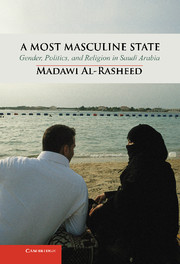Book contents
- Frontmatter
- Contents
- Acknowledgments
- Introduction
- 1 From Religious Revival to Religious Nationalism
- 2 Schooling Women
- 3 Symbols of Piety
- 4 The Quest for Cosmopolitan Modernity
- 5 Women in Search of Themselves
- 6 Celebrity Women Novelists and the Cosmopolitan Fantasy
- 7 Guarding Self and Nation
- Conclusion
- Glossary
- Bibliography
- Index
- References
Introduction
The ‘Woman Question’ in Saudi Arabia
Published online by Cambridge University Press: 05 February 2013
- Frontmatter
- Contents
- Acknowledgments
- Introduction
- 1 From Religious Revival to Religious Nationalism
- 2 Schooling Women
- 3 Symbols of Piety
- 4 The Quest for Cosmopolitan Modernity
- 5 Women in Search of Themselves
- 6 Celebrity Women Novelists and the Cosmopolitan Fantasy
- 7 Guarding Self and Nation
- Conclusion
- Glossary
- Bibliography
- Index
- References
Summary
Saudi women often conjure up contradictory images. They are either excluded, heavily veiled victims of their own religion and society, or wealthy, glamorous, cosmopolitan entrepreneurs benefiting from inherited wealth and state education. Notwithstanding these sensational stereotypes, the 2010 Global Gender Gap Report demonstrates that Saudi women lag behind in economic participation and political empowerment, although in health and educational attainment they may achieve better scores. The country has a very high gender gap index, ranked at 129 out of 134. Saudi women remain excluded from full participation in society, despite a recent increase in employment. In 2008, the unemployment rate for women was high, reaching 24.9%. Their employment opportunities increased during a four-year period, but women remain underrepresented in the economy in general. Their economic marginalisation is combined with strict rules that affect their lives as women. Their movement, educational choices, employment, and even health are subject to decisions made by their male guardians. In the West, the ban on women driving attracts attention and comment, but the deep-rooted exclusion of women and their subordination at the legal, social, political, and economic levels remains perhaps unmatched in the Muslim world.
- Type
- Chapter
- Information
- A Most Masculine StateGender, Politics and Religion in Saudi Arabia, pp. 1 - 42Publisher: Cambridge University PressPrint publication year: 2013



